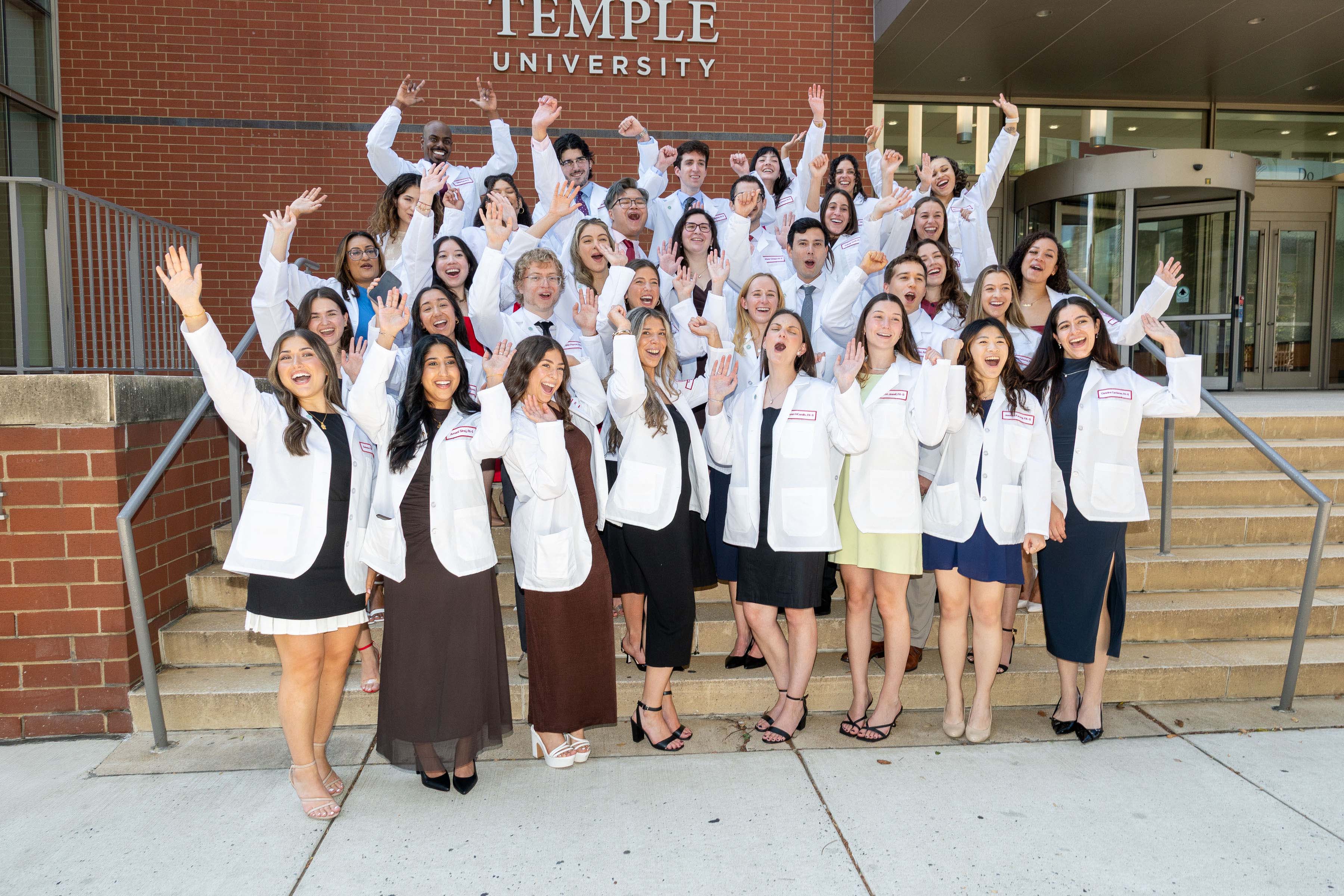A career in medicine was not among Maya Havusha’s plans when she graduated from the University of California, Santa Cruz with a bachelor’s degree in environmental studies. But observing the compassionate care her nephew received in a NICU for nearly a month opened her eyes to the profound impact his providers had on her family, and she began to realize she could be capable of that, too.
Similarly, Amani Siraj’s various interactions during family members’ “complicated medical issues” over the years inspired her to strive to recreate the consideration her family received.
“The healthcare team took the time to listen, create a deeply personal relationship with not only the patient but the family, and was truly there in our moments of vulnerability, while maintaining detail-oriented and accurate care,” Siraj says. “That’s the kind of provider I want to be.”
Both Siraj and Havusha are members of the Lewis Katz School of Medicine’s (Katz) Physician Assistant Class of 2027, which celebrated a significant milestone September 19: the white coat ceremony.
Dave Isgan, MHS, PA-C, Director of Student Affairs for the Physician Assistant Program a, says that after three-and-a-half whirlwind months for the students, the ceremony can help them feel like they truly belong.
On the eve of the ceremony, Ethan Rehn said that his time at Katz so far has mostly felt like a dream, while becoming a physician assistant still feels like a far-off goal. “But putting on the white coat is a wake-up call that this is really happening,” he says. “And even though there’s still tons of work to be done, being a certified PA is on the horizon.”
In medical education, the white coat is steeped in symbolism.
“To your patients, it will symbolize trust, expertise, hope,” said Amy Goldberg, MD, FACS, the Marjorie Joy Katz Dean of the Katz School of Medicine, in addressing the class at the ceremony. “To you and to us, it represents something else, too: the grit, determination, and perseverance that got you here and will carry you forward through this program.”
Practically speaking, the white coat also represents a significant shift in the students’ education, says Christine Mount, MS, PA-C, Director of the Physician Assistant Program. To this point, their days have been spent mostly in classrooms and the Schneck Gross Anatomy Lab. In the coming weeks, Mount says, “they will spend more time learning physical examination skills, practicing with patients, and experiencing firsthand what it means to provide care.” She adds, “It is here that they will discover the truth every clinician learns: that patients don’t always follow the textbook.”
Looking back on her early months in the program, Emileigh Rafidi says she’s struck by just how much there was to learn. There were times, she says, when the workload felt “impossible.” But she and her classmates found comfort in overcoming obstacles together. And now that they’ve completed this phase, they’ve forged bonds that feel unbreakable.
Rafidi says she gleaned from her application interview that Katz is a “close-knit community,” and that only affirmed that this was the program for her.
Siraj describes Philadelphia as “the hub of medicine,” noting an often-cited statistic that one in six physicians currently practicing the United States trained at some point in Philadelphia. But she ultimately chose Katz for a more personal reason: “I wanted a program that would prepare me to serve a diverse community,” Siraj says. “Coming from Northern Virginia and being a South Asian woman, I understand how much cultural competency matters. It matters who your provider is, who is caring for you, and whether they can truly see you. Katz embodies this.”
For many, the path to get here was long and winding.
Siraj was certified as a nursing assistant and worked as a medical assistant after graduating from Virginia Tech.
Havusha will be 39 when she graduates from Katz. She says she decided to become a physician assistant when she was 30, after working in various unrelated occupations. The intervening years have been filled “working, volunteering, and shadowing,” not to mention seeking out recommendation letters, writing application essays, and, of course, waiting and hoping.
In less than two years, the Class of 2027 will be graduating and preparing for its licensing examinations, and some of the students already envision what kind of physician assistant they want to be. Havusha is planning to go into pediatrics, Rafidi into obstetrics and gynecology. For others, it’s more of a philosophical consideration for the time being.
“I could say a lot of things as far as the kind of PA I hope to be,” Rehn says. “But something Professor Isgan said has stayed with me: ‘Be someone I can take my son to and trust to take care of him.’ I want to be a PA that people can be confident entrusting their loved ones to.”

